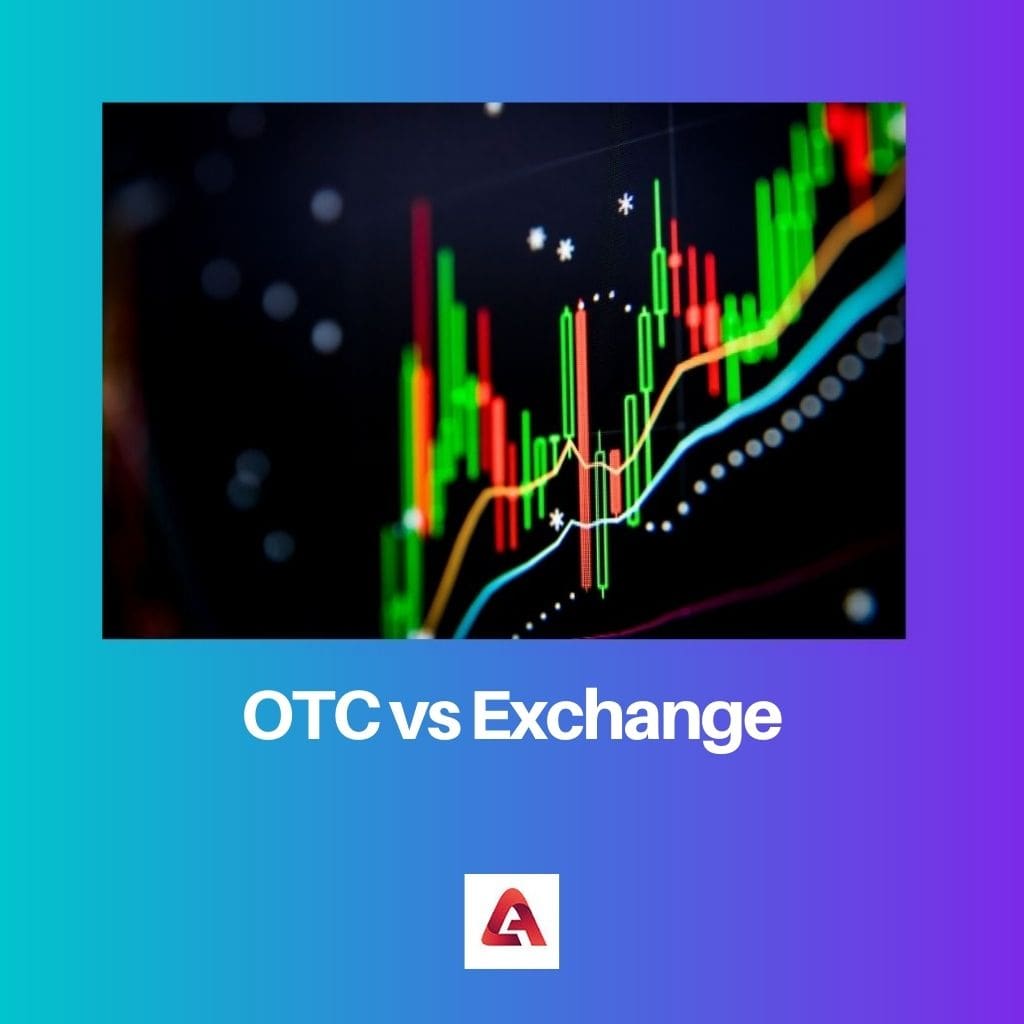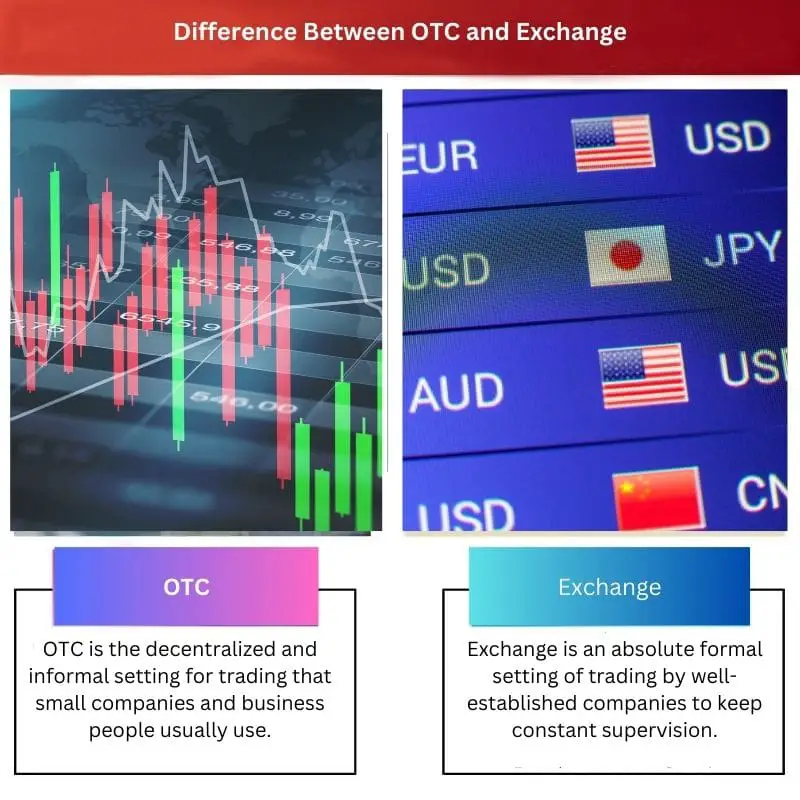OTC (over-the-counter) market and exchange are the terms that are used in the secondary market where issued securities and financial instruments are traded.
Exchange is an intricate network where there is constant surveillance of the participant’s actions so that there is no obligation of rules by the participants. OTC is a decentralized market that happens through a dealer; therefore, there are no rigid rules and obligations.
Key Takeaways
- Over-the-counter (OTC) markets are decentralized trading venues where financial instruments, such as stocks, bonds, and derivatives, are bought and sold directly between parties without the involvement of a centralized exchange, while exchanges are organized marketplaces where standardized financial instruments are traded according to established rules and regulations.
- OTC trading involves less transparency and regulation than exchange trading, as transactions are conducted privately and not subject to the same disclosure requirements or oversight. In contrast, exchanges provide a more regulated and transparent environment for trading.
- OTC markets can offer greater flexibility regarding transaction size, negotiation, and customization of financial instruments. At the same time, exchanges provide more standardized products and greater price transparency due to the centralized nature of the marketplace.
OTC vs. Exchange
The difference between OTC and Exchange is that over-the-counter refers to how securities are traded for companies without following any formal obligations. In contrast, Exchange is the marketplace for trading commodities, derivates with a centralized method to ensure fair and efficient trading.

OTC trading happens through the involvement of the mediator known as the dealer, whereas exchange is a formal network where trading follows varied rules and norms.
Comparison Table
| Parameters of Comparison | OTC | Exchange |
|---|---|---|
| Definition | OTC or over-the-counter is the method of trading for companies not listed formally. | Exchange is the method of trading commodities and derivatives for well-established companies in an organized manner. |
| Operated by | Securities that are traded over the counter are sold through the dealer. | The exchange is a centralized trading system with a well-organized network of people to ensure fair trading. |
| Formality status | OTC is the decentralized and informal setting for trading that small companies and business people use. | Exchange is an absolute formal setting of trading by well-established companies to keep constant supervision. |
| Work hours | It can be operated anytime because it is done through the dealer. | This works according to the exchange timings and not the entire day because it is an intricate network. |
| Defined Location | For trading through OTC one can use phones and laptops and connect from anywhere. | Exchange is the formal setting with a physical location to operate from. |
What is OTC?
OTC refers to the counter-trading method which small business people and companies use. It is also known as an off-exchange because the trading happens directly between the parties.
The OTC market is decentralized for unlisted companies. It can be operated from anywhere, such as emails, phones, telephone lines, etc. there do no need for any specific physical location to work.
There are some advantages and limitations to this method of trading. Some of the benefits are listed as follows:
- It is a low-cost trading method where investors can earn significant returns.
- Due to fewer obligations, many companies can be listed on the trade list.
Some of the limitations of OTC are mentioned as follows:
- It has less trade liquidity and transparency, creating issues for investors.
- Fewer regulations and a centralized structure make it prone to fraud and outdated information.

What is Exchange?
Exchange is the marketplace where commodities, derivatives, and financial instruments are traded. It is done formally to ensure liquidity and fair exchange of things among the traders.
Some examples of exchanges include the New York Stock Exchange and the Bombay Stock Exchange. They operate on a large scale and work with several rules and regulations.
Some of the advantages of Exchange can be:
- It is a formalized structure; therefore, it maintains transparency and liquidity of the investors and trading system.
- A stock exchange is used to raise the capital of companies that seek to grow and expand their operations.

Main Differences Between OTC and Exchange
- OTC or over-the-counter trade system is the trading method for companies not listed on the stock exchange. In contrast, Exchange is the formalized trading method where well-established companies trade to expand their functions.
- OTC is bilateral in its functions, which means that the trading happens between the two parties through a dealer, whereas Exchange is an intricate network where trade happens through the involvement of a number of traders.

- https://www.craig.csufresno.edu/ijb/Volumes/Volume%2013/V131-2.pdf
- https://www.nber.org/papers/w6179.pdf

Excellent analysis of the differences between OTC and Exchange trading systems. I particularly appreciate the informative nature of the post, it provided great insights into both methods.
I completely agree, the comprehensive overview of OTC and Exchange trading is very informative.
An interesting exploration of OTC and Exchange, offering valuable insights into the characteristics of each trading method.
This post made the distinctions between OTC and Exchange trading systems very clear. The comparison table is especially effective in summarizing the key differences.
While the analysis of OTC and Exchange is insightful, the writing style could be more engaging to maintain interest throughout the post.
This post stands out for its informative content and clear explanations of OTC and Exchange trading systems. A valuable resource for those seeking to understand these methods.
An intellectually stimulating analysis of OTC and Exchange trading, providing a nuanced understanding of the differences between these methods.
The post provides a balanced view of OTC and Exchange, highlighting the advantages and limitations of each system. Well-researched and informative.
The post could use more examples to illustrate the differences between OTC and Exchange. While the analysis is thorough, some practical examples would be helpful for readers.
I agree, real-world examples would enhance the understanding of the subject.
The informative nature of the post is commendable, offering a detailed and insightful comparison of OTC and Exchange trading systems.